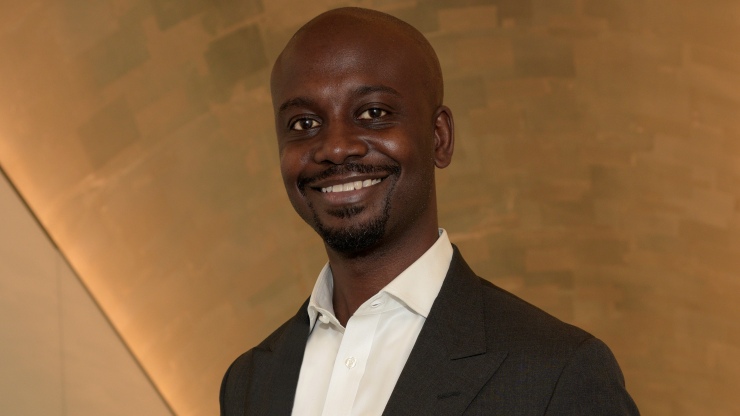Credit Suisse and the brokerage service provider Instinet recently began settling U.S. stock trades on a distributed ledger run by Paxos Trust. Societe Generale has said it will soon start settling trades on the ledger.
This is the first time a distributed ledger is being used for equities trading. It is also a rare example of the much-hyped technology moving out of test mode, and it could be the beginning of a wave of real-life use of blockchain-inspired technology on Wall Street.
Emmanuel Aidoo, head of distributed ledger strategy at Credit Suisse, called the recent launch a milestone.

“For the last 40-something years, you've had a single process of settling trades in the United States,” he said, referring to the Depository Trust & Clearing Corp. “From a symbolic perspective, this is huge.”
When people thought about blockchain five years ago, they thought U.S. equities were the last place the technology would be deployed because the market was already efficient, Aidoo said.
“We'd argue that actually there are efficiencies to be had in the post-trade settlement space, whether it's equities, loans or any other product or asset class,” he said.
The companies are calling this a blockchain, but it is really a private, permissioned ledger based on Enterprise Ethereum. Public blockchains have limited throughput, and at this point they would not be able to handle the speed and volume of the equities markets.
Using the Paxos technology, trades are settled at the end of the day, which will eventually drive cost savings and reduce risk, Aidoo said.
Although it would be possible to settle in real time, in what is sometimes called T+0, the market does not function that way, according to Aidoo.
But by settling at the end of the day, companies avoid having to post overnight margin. Trades settled on Paxos cost about 50% less than the current process, he said.
Charles Cascarilla, CEO and co-founder of Paxos, also sees this as a big deal. “We're moving real, live securities and using real, live dollars to settle trades,” he said.
Paxos launched this service under the aegis of a no-action letter from the Securities and Exchange Commission. The terms of the letter restrict the volume Paxos may carry on its system to 1% of the daily volume in 142 stocks.
The company will apply to the SEC for clearing agency approval this year. That would enable it to settle all U.S. equities.
“Then we'll be able to go live in a really big way," Cascarilla said.
What about the DTCC?
Wall Street traders have long hoped that blockchain technology could save them time and money by supplanting middlemen like the DTCC. The DTCC early on perceived this threat and started holding blockchain conferences and adopting the technology aggressively, building a new Trade Information Warehouse on a distributed ledger.
At a conference last year, Robert Palatnick, a managing director at the DTCC, said that people have been saying blockchain technology will replace the firm since 2015, yet the DTCC is still in business. He also said the DTCC has been working with its bank members on uses of blockchain.
“The DTCC is doing interesting things,” Aidoo said. “The answer could be that they end up doing exactly what Paxos does. I'd be encouraged by that outcome. Our aim as a bank on behalf of our clients and our shareholders is to make the processes and the cost base as efficient as possible.”
The DTCC has not gotten to equities yet.
“That's OK because this project is a good way to show them the light and show them the way,” Aidoo said. “I think a little bit of healthy competition is a good thing for the market.”
Cascarilla said Paxos uses the DTCC as a depository and that he does not see Paxos' platform as competition to the DTCC.
“It is meant to be an alternative to the clearing and settlement mechanism that happens today, so we are proposing a different way of approaching it," he said. "I don't think it's something that should be viewed as threatening, because I think it's complementary.”
Aidoo is also reluctant to get rid of middlemen like the DTCC.
“I think this is a happy first step, and we should be incremental with how we apply the technology, to make sure that the market runs efficiently, safely, securely, and we don't make mistakes,” he said.
One lesson Cascarilla has learned from this test is that the current environment is outdated.
“You'd be surprised how long it takes for information to move through the system,” he said. “So while we're able to move very quickly, at the end of the day, we're still operating using certain of the old pipes. We've noticed that there can be manual processes and exceptions that you wouldn't necessarily expect in a normal, straight-through processing environment.”
This is a result of legacy technology infrastructure at the banks and the fact that there has only ever been one settlement environment, he said.
Paxos hopes to announce additional market participants on its platform soon, Cascarilla said.
“Participants should get involved as soon as possible because everyone has lengthy change processes to their systems,” he said. “Certain participants have new product committees, cloud governance and security committees to work on. Those take time, even if the integration itself is very light.”





